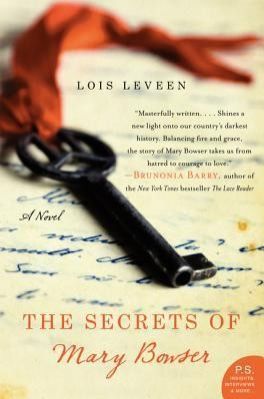'The Secrets of Mary Bowser' Author Lois Leveen Talks About Her Fascinating Debut Novel

For Lois Leveen, the Civil War was never a subject of interest. The author, who devoted much her post graduate education to African American studies, found the topic to be rather unexciting.
It all seemed very boring to me because it was just facts without a story or human component that really grabbed me, said Leveen during a talk at the Multnomah County Library.
But after reading A Shining Thread of Hope, that all changed. The book, which illustrates the history of black women in America, introduced Leveen to Mary Bowser. Bowser was born into slavery in Virginia and was freed so that she could obtain an education in the North. Remarkably, she returned during the Civil War as a spy for the union.
Eager to learn more about Bowser, Leveen began researching. These inquires led to the development of The Secrets of Mary Bowser, a compelling work of historical fiction and Leveen's debut novel.
The International Business Times had the chance to ask Leveen about her research methods and how her extensive education factored into the story's development.
The Secrets of Mary Bowser is about a largely uncovered subject in literature. Where did you derive inspiration for such an inimitable plot?
I learned about the real Mary Bowser quite accidentally while I was reading a book on women's history, and what she did captivated me. We all have causes we care about-the environment, poverty, finding a cure for a disease that touches the life of someone you know-but imagine giving up your friends, your possessions, your community, your freedom to travel someplace where you are completely vulnerable, just because you thought it might help that cause. You don't know how long it will take, or what the outcome will be. That's what Mary Bowser did. I wanted to understand why. What were her personal as well as her political motivations? What was the emotional cost of doing this extraordinary thing? I'd already been teaching and writing about slavery and the struggle for abolition, and writing The Secrets of Mary Bowser as a novel seemed like the best possible way to reach people who might never take a class or pick up a scholarly article or history book, but who would be as amazed as I was by what Bowser did, and what her story can teach us.
Clearly, the writing process involved extensive research. What were your methods of gaining insight into the past?
I have a Ph.D. in English with a specialty in African American literature, so I'd read quite a lot of slave narratives, sermons, poetry, and fiction, all written by American blacks in the time period. But life for slaves in urban, industrialized Richmond was unlike plantation slavery, so I read whatever historians' work I could get my hands on for that city, as well as for Philadelphia, where the middle section of The Secrets of Mary Bowser. is set. I pinned period maps to the wall, studied photographs both of the real-life people and places in the novel, and photographs to suggest what the invented characters might look like. I read city directories, diaries, newspapers from the period, so that I could imagine what life would really be like, for Mary and for all the characters in the book.
How did you so effortlessly weave together your imagination and historical fact?
I joke about spending time with my imaginary friends, but that's really the heart of it. I'm reading a book of historical fiction right now--I won't mention the title--and it's clear when the author wants to dump information onto the reader, because one character happens to be very well read with an expertise on everything from Aristotle to obscure business ventures in the early twentieth century. Clearly, when he speaks the author is trying to convey information to the reader, but it feels clunky. I know things--and so do my readers--that my narrator can't know. I need to stay true to telling her story, in her voice. For example, it's a well-known fact that during the Civil War, the president and first lady of the Confederacy had a child born, and another child die. If Mary is working as a purported slave in their home, these things would affect her--but I needed to imagine HOW, so that she's not just reporting this battle happened, that child was born. Instead, we're sharing her personal experience of what happens.
Self-betterment through learning is a prevalent theme in the book. You yourself have had a remarkable education. How did you incorporate your own scholarly ventures into your writing?
It's true; I'm an evangelist for education: it really does change lives. I was a book geek as a child, and in The Secrets of Mary Bowser, Mary also loves to read (although she is better read at a younger age than I was!). But as many people who've had an incredible educational opportunity know, seizing that opportunity can mean feeling cut off from your culture and your community. I felt culture shock going from a suburban public high school to Harvard University. Friends I met at Harvard who came from working class families felt that even more keenly. I drew on some of that emotional experience in telling Mary's story, recognizing of course that she was far more isolated than any of us were. At the same time, the book challenges the idea of ignorance as being the same as lacking formal education. Many of the African American characters don't have the chance to attend school, but they are savvy beyond what's expected of them, and conversely, characters that have a formal education don't always make the right choices. I like that you call it self-betterment, because that's really about drive versus complacency, which manifests in many forms, not just in attending a particular school.
The Secrets of Mary Bowser is available at Amazon.com.
© Copyright IBTimes 2024. All rights reserved.





















